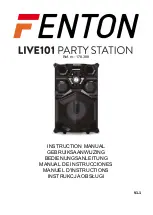
UAD Powered Plug-Ins Manual
- 160 -
Chapter 17: Lexicon 224
Parameters
Every tunable parameter from the original is present in the Lexicon 224
plug-in, and exposed as dedicated controls — inviting easy experimentation
and sonic exploration. All seven algorithms/nine programs are available un-
der the Program selection. Lexicon’s distinctive Bass/Mid “split decay” adjust-
ments and Crossover control set the highly tunable reverb image, along with
the Treble Decay for rolling off high frequencies. Depth sets the apparent dis-
tance between source and reverb, while Predelay produces a short delay be-
tween the sound source and the onset of reverberation. Diffusion affects how
quickly the echo density in the reverb builds up over time.
For total authenticity, the UAD-2 only System Noise control enables or dis-
ables the inherent dynamic system noise of the original Lexicon 224 hard-
ware. Specifically, disabling System Noise enables a more modern (i.e.,
cleaner) sound, removing the modeled gain stepping, parameter zippering,
and quiescent noise. The unique Lexicon 224 Mode Enhancement and Decay
Optimization controls improve reverb clarity. For insert use, the UAD-2 only
Dry/Wet and Solo parameters control the effect mix within the plug-in.
Clicking the “OPEN” text to the right of the display panel exposes several hid-
den controls, including Input/Output gain and Pitch Shift, and even a select-
able “Bug Fix” mode which enables/disables historical bugs fixes from the
Hall B and Chorus programs.
Taken together, the Lexicon 224 emulation for UAD-2 is the world’s most ex-
haustive and authentic model of a true studio classic.
All visual and aural references to Lexicon products and all use of Lexicon trademarks are being
made with written permission from Harman International Industries, Inc.
The original Lexicon 224 Digital Reverberator hardware
















































